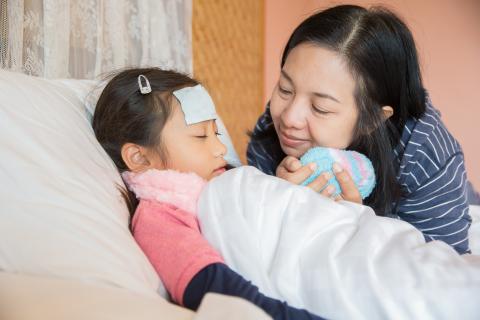7 Symptoms of Dengue Fever in Children, Prevention with 3M Plus and Vaccination
7 Symptoms of Dengue Fever in Children, Prevention with 3M Plus and Vaccination

Did Moms and Dads know that dengue is a serious disease that affects many children in various countries? This disease is caused by dengue virus infection transmitted through the bite of Aedes aegypti mosquitoes.1 It is important for parents and caregivers to recognize the symptoms of dengue to provide timely and appropriate care. Here are some of the main symptoms of dengue found in children:
1. High fever: The first common symptom is the onset of high fever with a body temperature often exceeding 39 degrees Celsius. This fever can last for several days.
2. Skin rash: Along with the fever, children may experience a skin rash. This rash appears as small red spots resembling dots on the skin. They usually occur on their chest, arms, and legs.
3. Headache: Children infected with dengue often experience severe and persistent headaches. This can cause discomfort and make the child feel uneasy.
4. Muscle and joint pain: This symptom is characterized by pain and stiffness in the muscles and joints. Children may complain of discomfort when moving.
5. Nausea and vomiting: Nausea and vomiting are common symptoms associated with dengue in children. This can lead to loss of appetite and the risk of dehydration.
6. Mild bleeding: A characteristic of dengue is mild bleeding. Children may experience frequent nosebleeds, bleeding gums, or easily get bruises.
7. Fatigue and weakness: Dengue can cause children to feel tired, weak, and lethargic throughout the day. They may experience excessive fatigue and difficulty in performing daily activities.4
Protecting Children from Dengue is Our Duty
Once again, it's important to note, Moms and Dads, that dengue is a disease caused by a dengue virus infection transmitted by mosquitoes1, particularly the Aedes aegypti mosquitoes that carry the virus. This is a disease that can affect anyone, regardless of their social status, age, young or old. If children can be affected, we as adults also have the risk of the infection.
One way to protect ourselves from dengue is through the 3M Plus approach and vaccination. The concept of 3M Plus (Menguras, Menutup, Mendaur Ulang) involves Draining, Covering, and Utilizing/Recycling.
Draining: The first action that must be taken is to drain water reservoirs that have the potential to become mosquito breeding grounds. Empty and clean containers like bathtubs, flower vases, and water-filled buckets. Make sure to drain them regularly, at least once a week, to eliminate water that could become mosquito breeding sites.
Covering: The next step is to tightly cover all water storage containers that cannot be drained. Ensure that all water containers, such as water tanks, drums, or rainwater storage bins, are securely covered. This will prevent mosquitoes from laying eggs and breeding inside.
Recycling: In addition to draining and covering, using water resources wisely is also crucial in preventing dengue. Use water efficiently and avoid wastage. Do not allow water logging around your home or yard. Ensure that drainage systems are clear and free from blockage that could cause waterlogging. We can also recycle leftover cans, barrels, and drums to create useful items.
Another “Plus” movement to avoid mosquito is crucial in preventing dengue. Wearing protective clothing such as long sleeves and long pants when going outdoors, especially during active mosquito times. Use mosquito nets or mosquito-repellent screens while sleeping to protect yourself from mosquito bites at night. Also, use mosquito repellent or safe mosquito repellent creams.2
Furthermore, consult with a doctor to gather information about vaccination, as the dengue vaccine has been developed as one of the proactive preventive measures. This vaccine can provide immunity against the dengue virus, minimizing the risk of contracting the disease or reducing the severity of symptoms if infected.5
Before undergoing the dengue vaccination, it is recommended to consult with a doctor. This consultation is essential to ensure that vaccination is appropriate for the individual. The doctor will assess their medical history, current health condition, and consider other factors before recommending dengue vaccination.
In addition to pre-vaccination consultation, it is important to follow the guidelines and vaccination schedule set by medical associations and regulatory bodies. Therefore, make sure to adhere to the guidelines and recommendations that are applicable in your residential area!
In situations where Moms and Dads or family members experience suspicious symptoms or there is an increase in dengue cases in the surrounding environment, do not hesitate to consult with a doctor immediately. Symptoms of dengue can include high fever, joint and muscle pain, rash, and more severe symptoms in serious cases.3 If they are not addressed by the right person, it can be dangerous! Let's share this article!
This article is intended for public information and awareness, and for educational purposes. The article is not intended as a form of medical advice. This article has been supervised by: Dr. Carissa R.V Pratiwi.
ANPROM/ID/QDE/0532 | Jun 2024
References:
- Indonesian Pediatric Society (IDAI). (2019). Understanding Dengue Fever DBD (Part 1 and 2). Available at: https://www.idai.or.id/artikel/seputar-kesehatan-anak/memahami-demam-berdarah-dengue (Accessed on February 2, 2022).
- Ministry of Health Indonesia. (2019). Efforts to Prevent Dengue Fever with 3M Plus. Available at: https://promkes.kemkes.go.id/upaya-pencegahan-dbd-dengan-3m-plus (Accessed on June 14, 2023).
- World Health Organization (WHO). (2021). Dengue and severe dengue. Available at: https://www.who.int/news-room/fact-sheets/detail/dengue-and-severe-dengue (Accessed on June 14, 2023).
- Ministry of Health Republic of Indonesia. (2022). Signs and Symptoms of Dengue Fever. Available at: https://yankes.kemkes.go.id/view_artikel/10/tanda-dan-gejala-demam-berdarah-dengue (Accessed on July 6, 2023).
- Ministry of Health Republic of Indonesia. Sehat Negeriku. (2023). Combat Dengue, Ministry of Health Develops Two Technologies. Available at: https://sehatnegeriku.kemkes.go.id/baca/umum/20230205/3642353/atasi-dengue-kemenkes-kembangkan-dua-teknologi-ini/#:~:text=Berdasarkan%20data%20Kementerian%20Kesehatan%2C%20di,anak%20usia%200%2D14%20tahun (Accessed on June 14, 2023).

Takeda is a global biopharmaceutical company that is patient-focused, values-based, and driven by research and development, with a commitment to delivering better health and a brighter future for people around the world. Our passion and efforts in providing potentially life-changing treatments for patients have been deeply rooted in our more than 230-year history in Japan.
© Copyright 2023 PT Takeda Innovative Medicines.
Takeda and the Takeda Logo are registered trademarks of PT Takeda Innovative Medicines. All rights reserved.
C-ANPROM/ID/QDE/0956 July 2025



